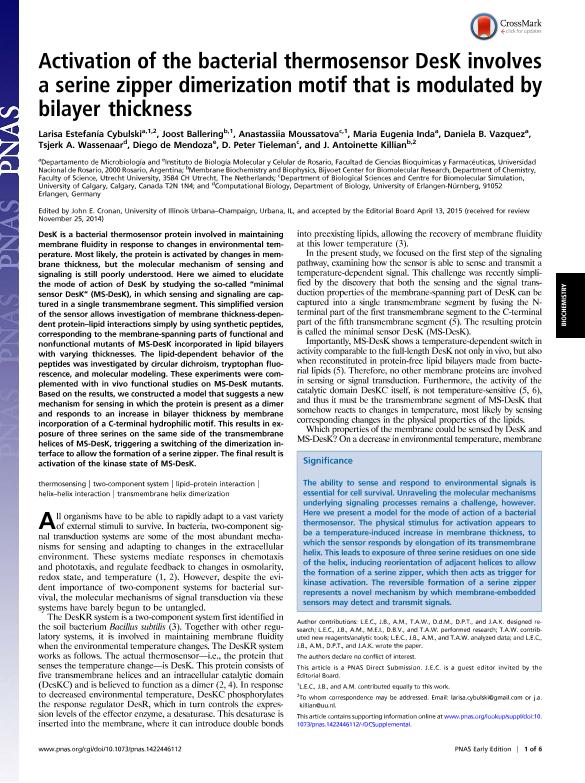Artículo
Activation of the bacterial thermosensor DesK involves a serine zipper dimerization motif that is modulated by bilayer thickness
Cybulski, Larisa Estefania ; Ballering, Joost; Moussatova, Anastassiia; Inda, María Eugenia
; Ballering, Joost; Moussatova, Anastassiia; Inda, María Eugenia ; Vázquez, Daniela Belén
; Vázquez, Daniela Belén ; Wassenaar, Tsjerk A.; de Mendoza, Diego
; Wassenaar, Tsjerk A.; de Mendoza, Diego ; Tieleman, D. Peter; Killian, J. Antoinette
; Tieleman, D. Peter; Killian, J. Antoinette
 ; Ballering, Joost; Moussatova, Anastassiia; Inda, María Eugenia
; Ballering, Joost; Moussatova, Anastassiia; Inda, María Eugenia ; Vázquez, Daniela Belén
; Vázquez, Daniela Belén ; Wassenaar, Tsjerk A.; de Mendoza, Diego
; Wassenaar, Tsjerk A.; de Mendoza, Diego ; Tieleman, D. Peter; Killian, J. Antoinette
; Tieleman, D. Peter; Killian, J. Antoinette
Fecha de publicación:
05/2015
Editorial:
National Academy of Sciences
Revista:
Proceedings of the National Academy of Sciences of The United States of America
ISSN:
0027-8424
Idioma:
Inglés
Tipo de recurso:
Artículo publicado
Clasificación temática:
Resumen
DesK is a bacterial thermosensor protein involved in maintaining membrane fluidity in response to changes in environmental temperature. Most likely, the protein is activated by changes in membrane thickness, but the molecular mechanism of sensing and signaling is still poorly understood. Here we aimed to elucidate the mode of action of DesK by studying the so-called "minimal sensor DesK" (MS-DesK), in which sensing and signaling are captured in a single transmembrane segment. This simplified version of the sensor allows investigation of membrane thickness-dependent protein-lipid interactions simply by using synthetic peptides, corresponding to the membrane-spanning parts of functional and nonfunctional mutants of MS-DesK incorporated in lipid bilayers with varying thicknesses. The lipid-dependent behavior of the peptides was investigated by circular dichroism, tryptophan fluorescence, and molecular modeling. These experiments were complemented with in vivo functional studies on MS-DesK mutants. Based on the results, we constructed a model that suggests a new mechanism for sensing in which the protein is present as a dimer and responds to an increase in bilayer thickness by membrane incorporation of a C-terminal hydrophilic motif. This results in exposure of three serines on the same side of the transmembrane helices of MS-DesK, triggering a switching of the dimerization interface to allow the formation of a serine zipper. The final result is activation of the kinase state of MS-DesK.
Archivos asociados
Licencia
Identificadores
Colecciones
Articulos(CCT - ROSARIO)
Articulos de CTRO.CIENTIFICO TECNOL.CONICET - ROSARIO
Articulos de CTRO.CIENTIFICO TECNOL.CONICET - ROSARIO
Citación
Cybulski, Larisa Estefania; Ballering, Joost; Moussatova, Anastassiia; Inda, María Eugenia; Vázquez, Daniela Belén; et al.; Activation of the bacterial thermosensor DesK involves a serine zipper dimerization motif that is modulated by bilayer thickness; National Academy of Sciences; Proceedings of the National Academy of Sciences of The United States of America; 112; 20; 5-2015; 6353-6358
Compartir
Altmétricas



